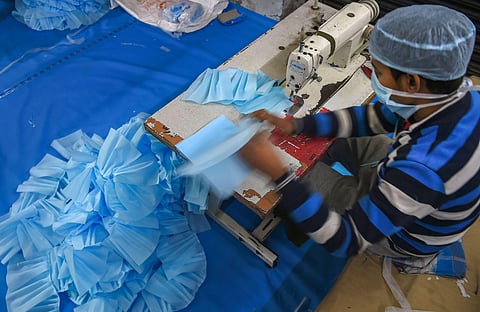

Today marks World Health Day, a global health awareness day observed every year on April 7 under the auspices of the WHO and other organisations. The theme this year focuses on supporting nurses and midwives. As we enter the second week of the second quarter of 2020, the world around us looks drastically different from what it did earlier. We are on Day 14 of the 21-day lockdown. The COVID-19 pandemic has been continuing its spread at a worrying speed. In the midst of this public health crisis, another human-made crisis has appeared. It is a crisis of messaging and communication, manifesting itself in the repeated references to the current situation as a “war”. Starting with PM Narendra Modi drawing parallels between the need to staying indoors and referring to the blackout drills of the 1971 Indo-Pak war, the war metaphor has dominated India’s discourse around COVID-19. However, the harm this war symbolism does to health professionals is being overlooked.
Equating the pandemic response to a war equates India’s healthcare workforce to members of the country’s Armed Forces. The same kind of stoicism and public silence that characterises our Armed Forces is now expected of physicians, nurses, community health workers and allied healthcare personnel. The result is Healthcare Professionals (HCPs) are being subjected to expectations of heroism and supreme sacrifice. There is little wonder that those speaking up against the shortage of Personal Protective Equipment (PPEs) is seen as unpatriotic and runs the risk of official punishment. The video of a coverall supplied to a tertiary government hospital with such broad mesh that water could sieve through it was particularly painful to watch. Such subpar PPE won’t survive a single splash of bodily fluids.
A soldier is expected to serve, gear or no gear. In the current milieu of “war against coronavirus”, HCPs are expected to continue caring for patients, including those who are asymptomatic but may be highly contagious, without adequate PPE. Their health and safety, and that of their family become a lower priority in public discourse. The situation of community health workers, such as ASHAs and ANMs, is worse. There have been reports of ASHA workers contact tracing without masks and gloves.Social media has also become dotted with hashtags of #CoronaWar, #CoronaWarriors #CoronaVillains and #CoronaFighters. Do note that using, supporting and encouraging the trending of hashtags such as #CoronaFighters and #CoronaWarriors for HCPs reinforces the expectation of them behaving like members of the defence services — expected to do their duty without a care for personal safety.
Society at large also suffers from the environment created by the war metaphor. In a war, authoritarian control of civil society, public discourse and suppression of civil rights is seen as acceptable. Hence, police wielding lathis against migrant labourers scurrying to get back home, queued en masse at the Anand Vihar bus station, evokes little sympathy. The public is also called upon to sacrifice their privacy as the Corona Kavach app gets the go-ahead without an effective, independent ethics board seemingly overseeing it. On the face of it, comparing the pandemic to war may seem beneficial. It is an easy instrument to boost morale and unity. Millions of workers and daily wage earners demonstrated an almost unquestioning acceptance of the unplanned lockdown and the abrupt halt of their sustenance systems, as they walked back quietly to the distant homes.
There was no resistance, only resignation in the face of the “war”. Good Samaritans have responded by offering food and water to those in transit. Gated colonies have also participated in this “war effort” by blowing conch shells, ringing bells, clanking pots and pans and lighting lamps, generating optimism and displaying gratitude to HCWs in spectacular synchrony.
Such visuals, however, risk airbrushing and hiding the grim realities faced daily by physicians, nurses, allied healthcare personnel and community health workers. It allows our policymakers and society to ignore that workplace safety does not exist for healthcare professionals.